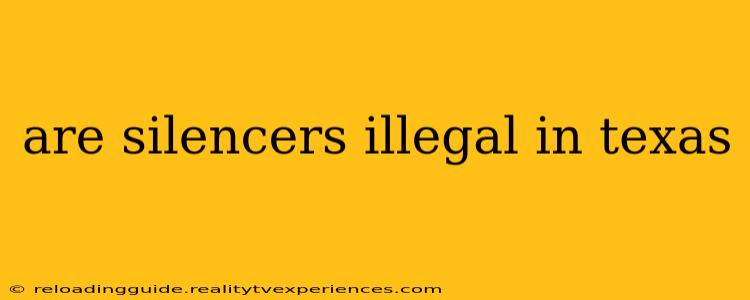The legality of silencers, often called suppressors, in Texas is a complex issue that requires careful consideration. While the general perception might be that they're automatically illegal, the reality is more nuanced. This guide will break down the Texas laws surrounding silencers, clarifying the legal requirements and potential penalties for non-compliance.
Texas Law on Silencers: The Basics
In Texas, silencers are regulated, not outright banned. This means possessing and using a silencer is permissible under certain conditions, primarily adhering to federal and state laws governing firearms and their accessories. The key legislation to understand is the National Firearms Act (NFA), a federal law, and its implementation within the state of Texas.
Federal Regulations (NFA)
The NFA of 1934 strictly regulates silencers, classifying them as "firearm silencers" or "silencers" under federal law. This means:
- Registration is mandatory: Before owning a silencer in Texas (or any other state), you must register it with the Bureau of Alcohol, Tobacco, Firearms and Explosives (ATF). This involves a thorough background check and a lengthy application process.
- Tax stamp required: Along with registration, a significant tax is levied on silencers. This tax stamp serves as proof of legal ownership.
- Transfer restrictions: Transferring ownership of a registered silencer requires following specific ATF procedures, including another background check and tax stamp transfer.
State Regulations (Texas)
Texas generally follows federal guidelines regarding silencers. The state doesn't have additional laws that outright prohibit their possession or use beyond the requirements set forth by the NFA. However, it's crucial to understand that any violation of Texas Penal Code related to firearms, such as unlawful carrying, discharging a firearm, or using a firearm during the commission of a crime, would still apply even if the firearm is equipped with a silencer.
What You Need to Legally Own a Silencer in Texas
To legally own a silencer in Texas, you must:
- Be eligible to own a firearm under both federal and state law: This includes passing a background check and not having any disqualifying criminal history.
- Complete the ATF Form 1 or Form 4 application: Form 1 is for manufacturing your own silencer, while Form 4 is for purchasing a commercially made silencer from a licensed dealer.
- Pay the applicable tax: This is a significant fee, as mandated by the NFA.
- Successfully undergo a background check: The ATF will conduct a thorough background investigation to ensure you meet the eligibility requirements.
- Comply with all applicable storage and transportation laws: Texas laws govern the safe storage and transportation of firearms, which would also apply to firearms equipped with silencers.
Penalties for Illegal Silencer Possession
Possessing an unregistered silencer in Texas carries severe penalties, including:
- Significant fines: These can range from thousands of dollars.
- Imprisonment: Federal and state penalties for illegal possession of firearms accessories are substantial.
- Forfeiture of the silencer: The illegal silencer will be confiscated by authorities.
Disclaimer: This Information is for Educational Purposes Only
This information is for educational purposes only and does not constitute legal advice. The laws surrounding silencers are complex and subject to change. Consult with a qualified legal professional specializing in firearms law in Texas before purchasing, possessing, or using a silencer to ensure full compliance with all applicable federal and state laws. Always prioritize safe and legal firearm handling practices.

